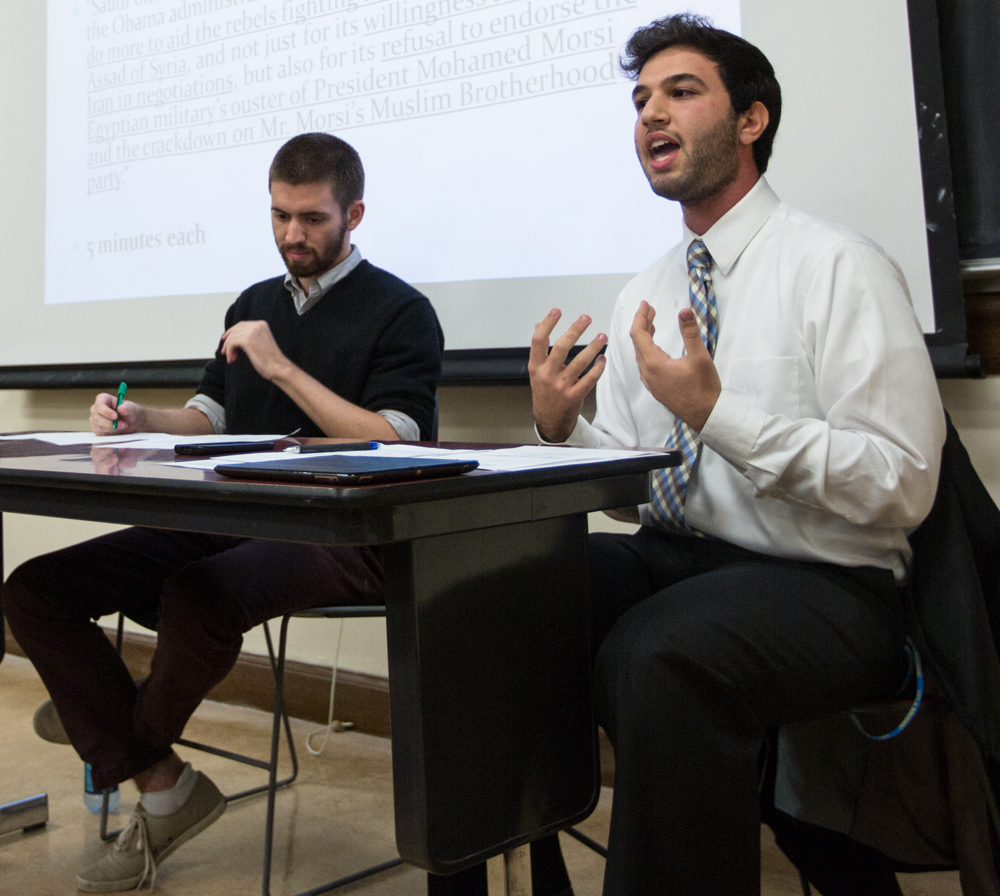Bruins for Israel hosts debate regarding U.S., Middle East relations

Members of Bruin Democrats and Bruin Republicans debated about the relationship between the United States and Israel.
By Janet Nguyen
Nov. 6, 2013 1:29 a.m.
About 60 students gathered on campus Tuesday night to watch a debate between members of Bruin Democrats and Bruin Republicans about the relationship between the United States and Israel.
The debate, hosted by Bruins for Israel, was held to educate the campus about different views of America’s role in the Middle East, said Miriam Eshaghian, a fourth-year psychobiology student and president of Bruins for Israel.
Israel and the U.S. have maintained close ties for decades. However, U.S. military aid to Israel has frequently drawn criticism from groups in the U.S. and abroad.
“When you think about the Middle East conflict, you think about the heated (Israeli-Palestinian) conflict, but that’s only a small fraction of what’s going on in the region,” Eshaghian said.
Alexander Lyons, external vice president of Bruin Democrats and third-year political science student, faced William Chakar, president of Bruin Republicans and third-year molecular biology student, in the debate Tuesday night.
The debaters addressed questions about what they thought the role of the U.S. should be in the current peace negotiations. They also talked about whether or not they think the U.S. has the right to dictate Israeli policies, namely policies which are directly linked to Israeli people’s security. Bruins for Israel also asked the debaters to talk about what they think are the most important reasons for a strong U.S.-Israel relationship.
Chakar said he thinks that the amount of money the U.S. invests in its relationship with Israel is currently where it should be, however, he approves of sequester cuts that trim foreign aid as Israel is in a good position to be self-sufficient. While he said that he thinks the U.S. has a moral obligation to intervene in some international affairs, Chakar said he thinks it should take a “balanced” approach when it comes to intervention in Israeli affairs.
“The U.S. should be moderately interventionist,” Chakar said. “Situations where the U.S. does need to jump in and help out. If we look over at the course of Israel, the U.S. is the key factor in ensuring Israel’s survival.”
Chakar added that he thinks it is important that the United States also establishes strong relationships with Palestine and other Arab nations, and works to promote democracy in the area.
On the Bruin Democrats’ side, Lyons said he thinks that the U.S. should maintain its current financial relationship with Israel, but that it should also increase spending on education in the U.S.
“I think America’s interests are best served in the Middle East by building America here at home,” Lyon said. “We’ve learned difficult lessons of stretching our capacities overseas.”
A major issue of contention between the two debaters focused on President Barack Obama’s foreign policies in the Middle East.
Chakar claimed that Obama’s involvement in Middle Eastern countries was analogous to a student going into a midterm without studying for it. He also criticized Obama by saying that he could not “balance his checkbook” or negotiate with the Republican Party.
“Obama’s handling of Middle East policies have been absolutely horrible,” Chakar said.
In response, Lyon said he thought that Obama’s handling of the U.S.-Israel relationship was the best it could be at the time, though many situations Obama dealt with were not ideal.
At different points of the debate, Chakar and Lyon mentioned the Israeli-Palestinian conflict. Both suggested that Israelis and Palestinians reach a two-state solution.
In their closing remarks, the debaters said they wanted a safe and secure Israel, as well as peace in the region.
After the debate, some attendees said that they thought it was interesting.
“I was surprised at how civil the debate was; debates of these nature tend to be contentious,” said Adele Lhrar, a third-year political science major.


